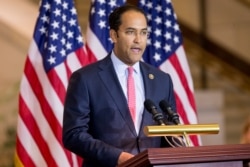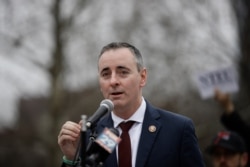Just four of 197 Republican U.S. House members voted to deem “racist” a series of remarks by President Donald Trump aimed at several nonwhite congresswomen. Will Hurd of Texas, Susan Brooks of Indiana, Brian Fitzpatrick of Pennsylvania and Fred Upton of Michigan all split with congressional Republicans and the president to pass the legislative condemnation Tuesday.
Trump denounced four outspoken, liberal Democratic congresswomen for their criticism of U.S. policy, tweeting Sunday, “Why don’t they go back and help fix the totally broken and crime infested places from which they came.”
All of the women — Alexandria Ocasio-Cortez of New York, Ilhan Omar of Minnesota, Rashida Tlaib of Michigan and Ayanna Pressley of Massachusetts — are U.S. citizens, including three born in the country. Omar was born in Somalia but later gained U.S. citizenship.
Trump’s words sparked outrage from both parties, prompting passage of the resolution in the Democratic-controlled House.
So who are the four who broke with their party? They are legislators with at least slight histories of bipartisanship and most with competitive elections looming in 2020.
Will Hurd, Texas
Hurd gained notoriety on social media for his 1,600-mile road trip from Texas to Washington, D.C., with then-Democratic House member (and now presidential candidate) Beto O’Rourke in 2017. The trip, which involved impromptu sing-alongs and casual discussions of policy, was hailed as a lighthearted example of bipartisanship.
Now, Hurd is the only remaining Republican representing a congressional district along the U.S.-Mexico border. In 2018, Hurd won 49.2% of the vote to his Democratic competitor’s 48.7%, in the single most competitive race in the state that year.
His district is more than 70% Hispanic, according to the U.S. Census Bureau. A community that may resent the president’s remarks on race and his hard-line immigration policies.
During Trump’s first year in office, Hurd voted in accordance with the president’s stance almost 95% of the time, but this year, that number has plummeted to just 40%.
Susan Brooks, Indiana
Brooks took a similar approach to the president’s remarks, tweeting that his words were “inappropriate” and “do not reflect American values,” later expressing disappointment in Democrats for what she called “anti-Semitic and hateful speech.”
Alongside Upton and another congressman, Brooks co-chairs the Tuesday Group, an informal moderate Republican group in the House. She’s worked with Democrats on issues ranging from the opioid crisis to job training.
Still, she’s voted in alignment with Trump 97.7% of the time since the president took office, with no dramatic drop between Trump’s first and second years. Brooks is anti-abortion and anti-gun control, and supports repealing and replacing the Affordable Care Act, better known as Obamacare. All of these positions place her squarely in the Republican policy camp.
Brooks lives in a comfortably Republican district, and isn’t running for re-election in 2020, possibly freeing her to vote as she likes without fearing voter retribution.
Brian Fitzpatrick, Pennsylvania
Fitzpatrick’s split from congressional Republicans Tuesday wasn’t completely unexpected. In the past, he opposed a Republican replacement for Obamacare, as well as Trump’s 2017 bans on travel from several Muslim-majority countries, and has supported LGBT-friendly measures such as the Equality Act.
Though he voted in alignment with Trump nearly 85% of the time during the president’s first year in office, that number has nose-dived to just 25% this year.
In 2018, Fitzpatrick’s district was redrawn as part of a statewide redistricting ordered by the Pennsylvania Supreme Court to eliminate unconstitutional gerrymandering that had favored Republican candidates. Fitzpatrick was the only Republican from the state who didn’t join a lawsuit challenging the new map.
His district saw some of the most minor changes, though it would have switched from Trump-leaning in 2016 to Hillary Clinton-leaning.
Fred Upton, Michigan
Though his votes matched Trump’s views nearly 95% of the time during the president’s first year in officer, Upton has stuck by his side just 54% of the time this year. The congressman won re-election by nearly 5 percentage points in 2018, but that’s lower than his usual margins, which go back to 1986.
Upton co-chairs the moderate Tuesday Group along with Brooks and another Republican congressman. He leaned away from the party in 2018, when he joined the Climate Change Solutions caucus, and was one of seven House Republicans to split from the party on legislation to end a January government shutdown. Hurd and Fitzpatrick were part of this group as well.
Also joining the Democrats was Justin Amash of Michigan, who left the Republican Party in early July to become an independent.








